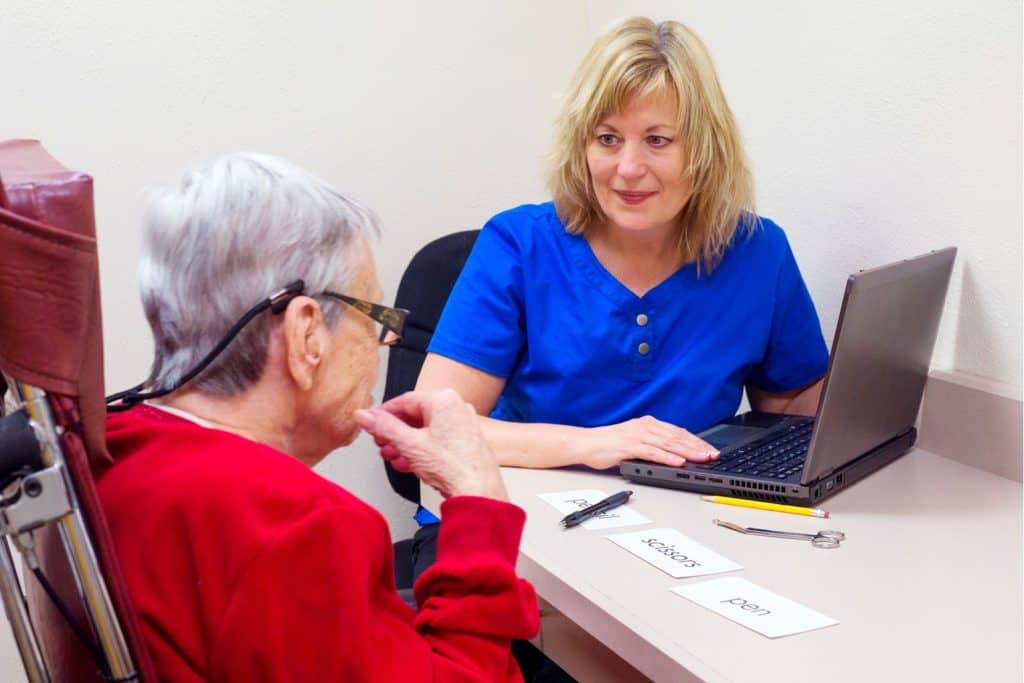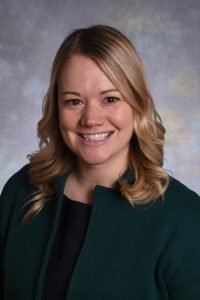Communication and swallowing disorders following stroke

With speech, language, voice, and swallowing disorders common following stroke, head and neck cancer, traumatic brain injury (TBI), COVID-19, and a variety of other illnesses and injuries, speech-language pathologists in the Speech-Language Pathology Department at Hennepin Healthcare encourage colleagues to learn the signs—and seek an evaluation—if they have concerns about themselves, a loved one, or a patient served.
“A person’s ability to communicate effectively is easy to take for granted until it is compromised,” says Adam Terrell, Speech Pathologist in the Traumatic Outpatient Brain Injury Program. “Communication enables us to connect with others. It is needed to learn, to earn a living, and to fulfill our basic wants and needs. Given this, people must know the signs of communication disorders and the availability of help from certified speech-language pathologists.
The causes of speech and language problems that begin for the first time in adulthood can vary widely. Common causes include brain injury, stroke, COVID-19, and diseases that affect the brain such as Alzheimer’s disease, amyotrophic lateral sclerosis (ALS), multiple sclerosis, and Huntington’s disease. They can also stem from cancers of the head and neck, breathing problems, and vocal cord injury.
For adults, the signs of speech and language disorders may include the following:
- problems saying sounds correctly
- slurred or slowed rate of speech
- problems coordinating mouth or speech movements
- difficulty imitating speech sounds
- struggles to get out sounds or words
- repetition of sounds, words, or parts of words
- changes in voice (e.g., hoarse, raspy, breathy, nasal, or low-volume voice)
- trouble thinking of the words they want to say
- problems expressing what they want or need
- saying words in the wrong order
- trouble following directions or conversations
- difficulty understanding what others say
- new trouble reading, writing, spelling, or using numbers
- difficulties with attention, memory, or problem-solving
Speech-language pathologists (SLPs) at Hennepin Healthcare evaluate adults for communication disorders in a variety of settings including hospitals, rehabilitation centers, and outpatient clinics. They help their patients and clients get back the skills important to them for their everyday activities.
SLPs can help people understand questions, directions, conversations, and stories; express thoughts and words; and read and write. They can also help people find other ways to communicate if they are having difficulty with spoken or written communication. These may include pointing or using other gestures, drawing pictures, or using an augmentative and alternative communication (AAC) device.
SLPs are also uniquely positioned to treat difficulties with cognition including attention, executive function (organization, planning, and problem-solving), and memory. Left untreated, these difficulties could prevent a return to work and impact one’s ability to tend to family responsibilities. Cognitive-communication challenges can lead to social isolation, depression, and other mental health problems as well as impact a person’s ability to advocate, participate in daily activities, and maintain relationships. SLPs can collaborate with individuals to improve these skills and develop appropriate strategies. The focus is on the person’s specific challenges as well as regaining the skills that are most important to their daily life and priorities.
Some adults may develop swallowing problems from the same illnesses or injuries that can cause communication disorders. Swallowing disorders, called dysphagia, can affect a person’s ability to eat, drink, and take medicine. SLPs diagnose and treat dysphagia. They can help a person with dysphagia strengthen their muscles to chew and swallow; identify strategies that make it easier or safer to swallow; and advise people on changes to the textures of their diet, including softer foods.
Some signs of dysphagia may include trouble moving food from the mouth to the throat, coughing during or right after eating or drinking, feeling like food is stuck in the throat, and pain or discomfort during eating or drinking.
“Eating and drinking are not only necessary for us to live but also are often at the center of our social gatherings,” Adam Terrell reminds us. Swallowing problems can improve tremendously with treatment from SLPs.
May is Better Hearing and Speech Month, a time to raise awareness about communication disorders and available treatment options that can improve the quality of life for those who experience problems speaking or hearing. To schedule an assessment for a communication or swallowing disorder, contact the SLP department at 612-873-8550. More information is available at www.asha.org/public.

 Adam Terrell, MS, CCC-SLP works with patients in the Traumatic Brain Injury Outpatient Program, who have suffered a brain injury. He also performs research on aphasia, a disorder that results from damage to parts of the brain that are responsible for language
Adam Terrell, MS, CCC-SLP works with patients in the Traumatic Brain Injury Outpatient Program, who have suffered a brain injury. He also performs research on aphasia, a disorder that results from damage to parts of the brain that are responsible for language
Allison Carolan, MS, CCC- SLP, works with patients who’ve suffered a traumatic brain injury, stroke, encephalopathy, anoxic brain injury, or various other neurogenic conditions. She is also involved in research with the Hennepin Healthcare Traumatic Brain Injury Center.

